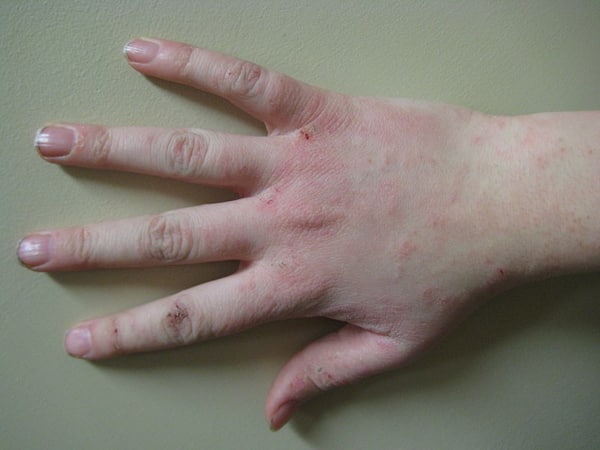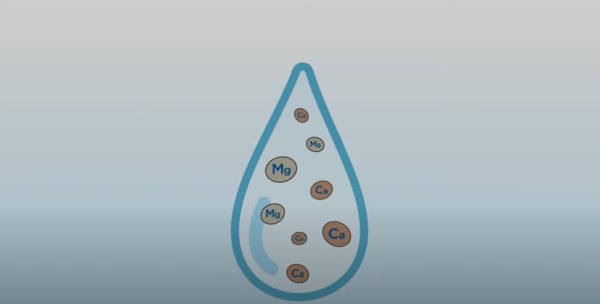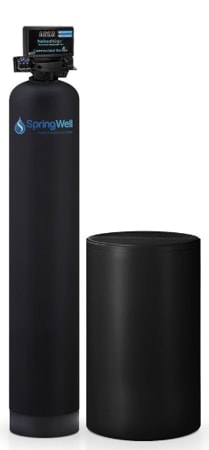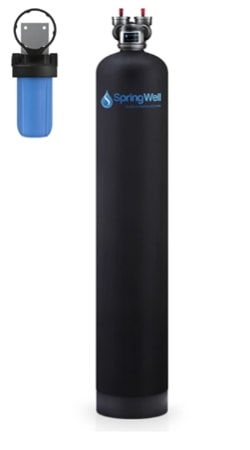Yes. Well water with high calcium, magnesium, and iron concentration can often make you itchy. These minerals make well water hard, and hard water doesn’t go well with soaps and shampoos. It fails to make a proper lather and doesn’t remove them properly. So, the leftover soap and shampoo can make you feel itchy. You would end up scratching yourself unless you do something about it.

You must have noticed white scales on your faucets, bathtubs, and appliances. Similarly, the soap scum builds up on your skin. Hard well water leaves soap residue on your skin instead of making lather. The residue clogs skin pores and stops the natural oils from spreading across your skin, resulting in malnutrition. This makes you itch and scratch your skin.
Related Guide: Why is Well Water Turning Hair Orange?
Minerals and heavy metals like iron in well water can form free radicals on your skin. It can damage healthy skin cells, causing wrinkles and loose skin.
Unfiltered well water contains sediment, dirt, sand, and silt. These pollutants are bad for your skin too.

How to Treat Well Water to avoid Itchy Skin?
The best way to avoid skin problems caused by hard well water is to fix the root cause. You’ll need to remove calcium, magnesium, and iron from your well water before it enters your plumbing system. A water softener and an iron filter are recommended to make your water fit for everyday use.
Water Softeners
A water softener is used to make water soft. There are two types of water softeners available: salt-based and without salt. A salt-free system is generally known as a water conditioner.
Recommended Salt-Based Water Softener: SpringWell’s Salt Based Water Softener System

SpringWell’s salt-based water softener will improve your skin and hair health. It reduces detergent use by up to 40% and extends the life of your appliances.
The unit can handle extremely high levels of water hardness and deliver up to 20 GPM flow rate. The system comes with a Bluetooth control head, a separate brine tank, an installation kit, and a lifetime warranty.
Recommended Salt-Free Water Softener: FutureSoft® Salt-Free Water Softener

It is a salt-free system recommended for large homes. It also delivers up to 20 GPM flow rate. You can manage the system with a Bluetooth-enabled control head. The salt-free softener can be paired with a UV purifier, RO system, and a whole house water filter.
It comes with a sediment filter, a lifetime warranty, and everything you need to install the unit.
Shower Filters
You can install a shower filter to avoid skin damage due to hard well water. A shower filter improves water quality by passing it through various filtration media.. Some shower filters also increase water pH; slightly alkaline water is good for your skin.
Air Injection Filters
An air injection filter comes in handy when skin problems are caused by iron, manganese, and sulfur.
An air injection filter oxidizes iron, manganese, and sulfur. Filtration media then remove the oxidized contaminants. Air injection systems are installed to deal with a high concentration of these 3 contaminants.
How to Avoid Itching and Skin Damage if you don’t have Soft Water?
You can still avoid hard water damage by taking a few steps.
Use Cleaner: Avoid using typical soaps if you have hard water at home. Use cleansing milk as it is better than soaps.
Moisturize: Don’t forget to moisturize after showering with well water. Apply a lotion or body cream that helps remove mineral buildup from the body.
Use Bottled Water for your Hair: You can use bottled water to wash your hair. Hair fall is more of a concern than dry skin. Bottled water may be costly, but it is the best way to protect your hair from hard water.
Avoid Long Hot Baths: Make sure you reduce your bathing time. More exposure to hard well water can cause more skin damage.
Can hard water itch develop into a rash?
Yes. Hard water itch can develop into a rash if you don’t take care of it. A group of spotted, pink, or red skin marks accompanied by itching is known as hard water rash. Its symptoms include itching, red bumps on the skin, dryness, flaking, lesions, scaling, and oozing from patches. Hard water rash is spread by scratching yourself.
Genesee County Health Department, Michigan, has published a detailed report on hard water rash.
How to avoid hair fall from well water?
The primary remedy for preventing skin damage and hair fall is to install a water softener. You can read more about preventing hair fall due to well water here.
